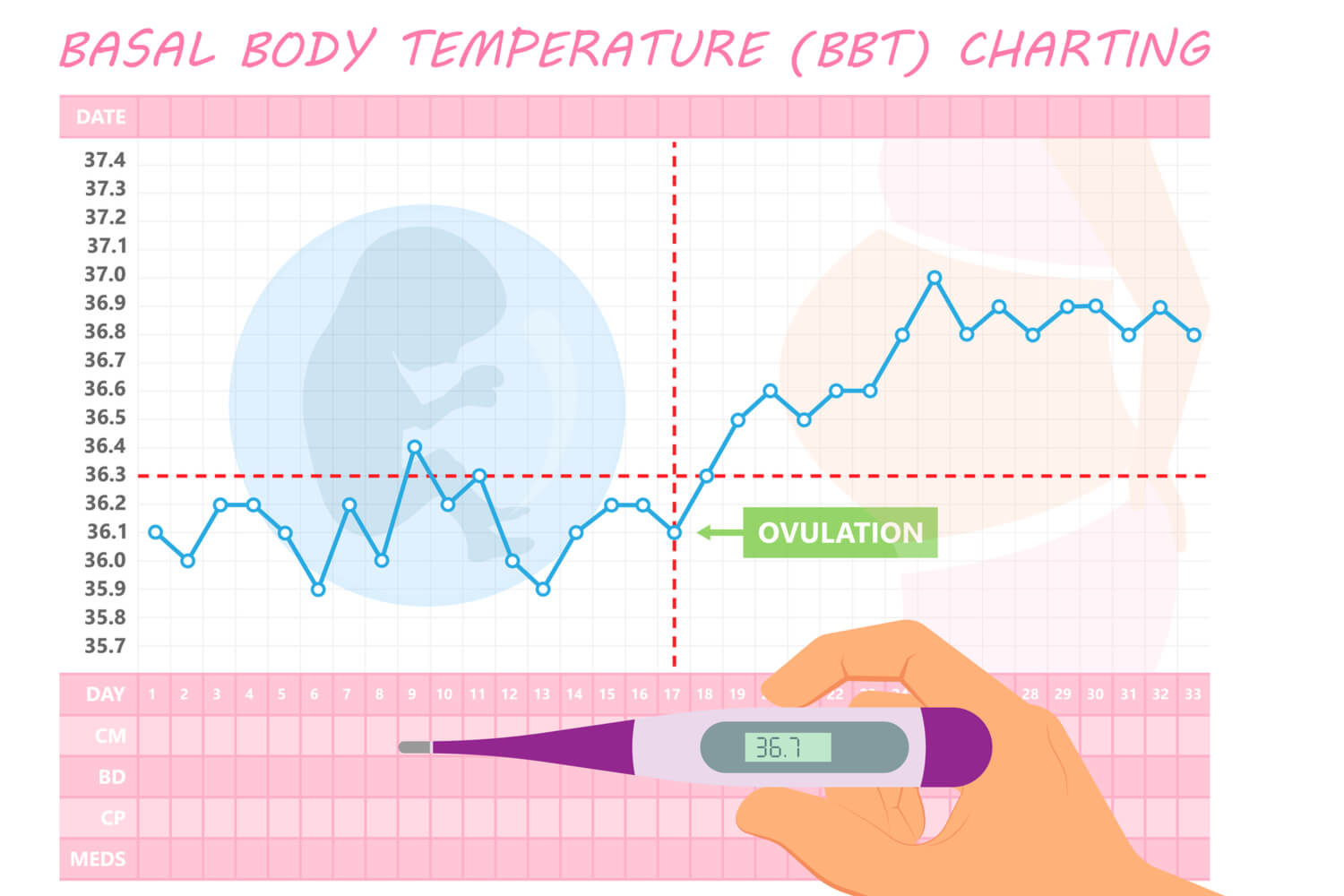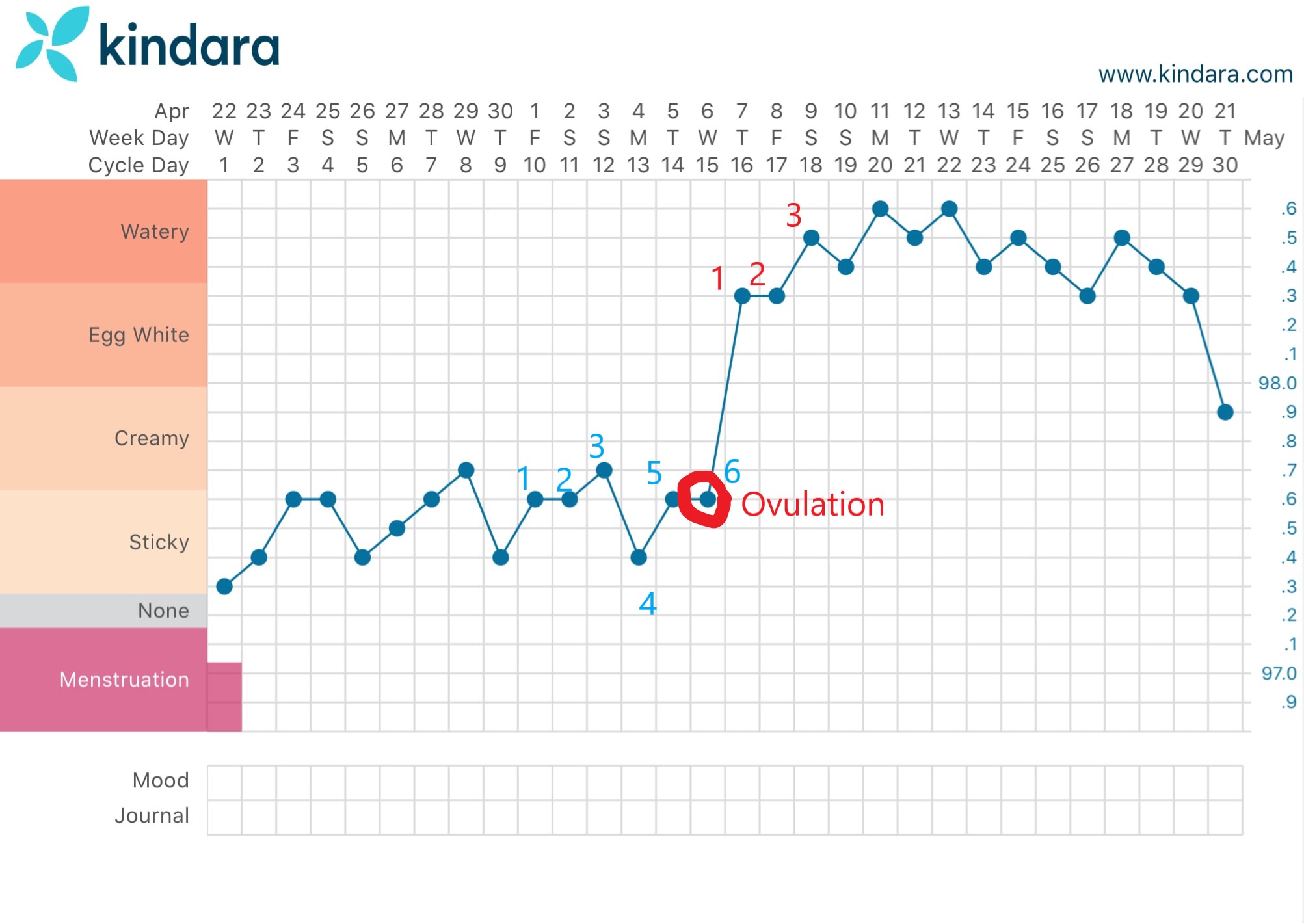Basal Body Temperature Ovulation Dip - An implantation dip refers to a decrease in basal body temperature of a few tenths of a degree — for example from 97.9 to 97.6°f (36.6°c to 36.4°c) — for a period of one day. Your bbt fluctuates in response to several factors, but hormones like estrogen and. Implantation dip refers to a change in the basal body temperature (bbt) that occurs around the time of implantation of a fertilized egg in the uterus. Implantation dip is a decrease in bbt by at least 0.3 degrees that occurs about a week after ovulation, roughly around the time of implantation, or the point at which a. About one day before ovulation, bbt typically dips about 0.5 degrees to its lowest point (on average, 97 to 97.5 degrees f). Although sometimes used as a positive indication of pregnancy, it may not be a. Your basal body temperature, or bbt, is the range of numbers you see on your thermometer throughout the day when you are at rest.
Implantation dip refers to a change in the basal body temperature (bbt) that occurs around the time of implantation of a fertilized egg in the uterus. Your basal body temperature, or bbt, is the range of numbers you see on your thermometer throughout the day when you are at rest. An implantation dip refers to a decrease in basal body temperature of a few tenths of a degree — for example from 97.9 to 97.6°f (36.6°c to 36.4°c) — for a period of one day. About one day before ovulation, bbt typically dips about 0.5 degrees to its lowest point (on average, 97 to 97.5 degrees f). Although sometimes used as a positive indication of pregnancy, it may not be a. Implantation dip is a decrease in bbt by at least 0.3 degrees that occurs about a week after ovulation, roughly around the time of implantation, or the point at which a. Your bbt fluctuates in response to several factors, but hormones like estrogen and.
Your bbt fluctuates in response to several factors, but hormones like estrogen and. Implantation dip refers to a change in the basal body temperature (bbt) that occurs around the time of implantation of a fertilized egg in the uterus. About one day before ovulation, bbt typically dips about 0.5 degrees to its lowest point (on average, 97 to 97.5 degrees f). An implantation dip refers to a decrease in basal body temperature of a few tenths of a degree — for example from 97.9 to 97.6°f (36.6°c to 36.4°c) — for a period of one day. Implantation dip is a decrease in bbt by at least 0.3 degrees that occurs about a week after ovulation, roughly around the time of implantation, or the point at which a. Although sometimes used as a positive indication of pregnancy, it may not be a. Your basal body temperature, or bbt, is the range of numbers you see on your thermometer throughout the day when you are at rest.
Reasons for a Dip in Basal Body Temperature After Ovulation LoveToKnow
An implantation dip refers to a decrease in basal body temperature of a few tenths of a degree — for example from 97.9 to 97.6°f (36.6°c to 36.4°c) — for a period of one day. Implantation dip refers to a change in the basal body temperature (bbt) that occurs around the time of implantation of a fertilized egg in the.
Implantation Dip When Does it Occur? Being The Parent
An implantation dip refers to a decrease in basal body temperature of a few tenths of a degree — for example from 97.9 to 97.6°f (36.6°c to 36.4°c) — for a period of one day. Although sometimes used as a positive indication of pregnancy, it may not be a. Your basal body temperature, or bbt, is the range of numbers.
Why Tracking Your Basal Body Temperature is Important for Fertility
About one day before ovulation, bbt typically dips about 0.5 degrees to its lowest point (on average, 97 to 97.5 degrees f). Although sometimes used as a positive indication of pregnancy, it may not be a. Your basal body temperature, or bbt, is the range of numbers you see on your thermometer throughout the day when you are at rest..
Ovulation Basal Temperature Chart Sample
About one day before ovulation, bbt typically dips about 0.5 degrees to its lowest point (on average, 97 to 97.5 degrees f). An implantation dip refers to a decrease in basal body temperature of a few tenths of a degree — for example from 97.9 to 97.6°f (36.6°c to 36.4°c) — for a period of one day. Your basal body.
Learn the Basics Behind Basal Body Temperature (BBT) Glow Community
Implantation dip refers to a change in the basal body temperature (bbt) that occurs around the time of implantation of a fertilized egg in the uterus. Your basal body temperature, or bbt, is the range of numbers you see on your thermometer throughout the day when you are at rest. About one day before ovulation, bbt typically dips about 0.5.
BBT Charting Top 10 Questions about Basal Body Temperatures
About one day before ovulation, bbt typically dips about 0.5 degrees to its lowest point (on average, 97 to 97.5 degrees f). Implantation dip refers to a change in the basal body temperature (bbt) that occurs around the time of implantation of a fertilized egg in the uterus. Implantation dip is a decrease in bbt by at least 0.3 degrees.
Basal Temperature Chart When Pregnant
Your bbt fluctuates in response to several factors, but hormones like estrogen and. Although sometimes used as a positive indication of pregnancy, it may not be a. Implantation dip is a decrease in bbt by at least 0.3 degrees that occurs about a week after ovulation, roughly around the time of implantation, or the point at which a. An implantation.
BBT Chart Basal Body Temperature Chart BBT Chart For Ovulation
Your bbt fluctuates in response to several factors, but hormones like estrogen and. Although sometimes used as a positive indication of pregnancy, it may not be a. Implantation dip refers to a change in the basal body temperature (bbt) that occurs around the time of implantation of a fertilized egg in the uterus. An implantation dip refers to a decrease.
Temperatura basal ¿cómo funciona?
Your bbt fluctuates in response to several factors, but hormones like estrogen and. Implantation dip is a decrease in bbt by at least 0.3 degrees that occurs about a week after ovulation, roughly around the time of implantation, or the point at which a. Although sometimes used as a positive indication of pregnancy, it may not be a. Your basal.
How to Track and Chart Your Basal Body Temperature
Although sometimes used as a positive indication of pregnancy, it may not be a. Your bbt fluctuates in response to several factors, but hormones like estrogen and. Your basal body temperature, or bbt, is the range of numbers you see on your thermometer throughout the day when you are at rest. Implantation dip is a decrease in bbt by at.
Implantation Dip Is A Decrease In Bbt By At Least 0.3 Degrees That Occurs About A Week After Ovulation, Roughly Around The Time Of Implantation, Or The Point At Which A.
Implantation dip refers to a change in the basal body temperature (bbt) that occurs around the time of implantation of a fertilized egg in the uterus. About one day before ovulation, bbt typically dips about 0.5 degrees to its lowest point (on average, 97 to 97.5 degrees f). Your bbt fluctuates in response to several factors, but hormones like estrogen and. An implantation dip refers to a decrease in basal body temperature of a few tenths of a degree — for example from 97.9 to 97.6°f (36.6°c to 36.4°c) — for a period of one day.
Your Basal Body Temperature, Or Bbt, Is The Range Of Numbers You See On Your Thermometer Throughout The Day When You Are At Rest.
Although sometimes used as a positive indication of pregnancy, it may not be a.









:max_bytes(150000):strip_icc()/Screen-Shot-2015-10-09-at-1.04.01-PM-56a516485f9b58b7d0dac883.png)